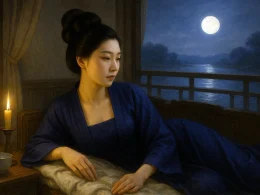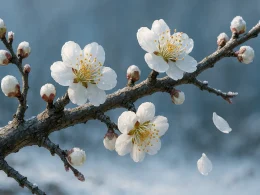Soughing, the cool breeze blows;
My wooded dell clean grows.
It drives smoke off the rill,
Rolls up mist over the hill,
Leaves no trace when we part,
And moves as if moved at heart.
When sunset calms the scene,
Hear the song of pines green.
Original Poem
「咏风」
王勃
肃肃凉风生,加我林壑清。
驱烟寻涧户,卷雾出山楹。
去来固无迹,动息如有情。
日落山水静,为君起松声。
Interpretation
This poem was composed during Wang Bo's period of political disillusionment. Though renowned for his talent since youth, his life was marked by misfortune and unfulfilled aspirations. In his Preface to the Pavilion of Prince Teng, he wrote: "Though I have no opportunity to tie the enemy's rope like Zhong Jun at his youth, I cherish the ambition to cast aside my writing brush and emulate Zong Que's soaring spirit," expressing his regret at having no avenue to serve his country. In this poem, he uses the pure wind as a metaphor for his ideals, embodying his aspirations to benefit the people through the wind's nobility and diligence.
First Couplet: "肃肃凉风生,加我林壑清。"
Sù sù liáng fēng shēng, jiā wǒ lín hè qīng.
"The solemn, cool wind arises, / Bringing clarity to my woods and valleys."
With straightforward diction, the poem introduces autumn wind's arrival, establishing the central subject while implying the poet's mental clarity inspired by the wind.
Second Couplet: "驱烟寻涧户,卷雾出山楹。"
Qū yān xún jiàn hù, juǎn wù chū shān yíng.
"It dispels smoke to reveal streamside homes, / Rolls back mist from mountain dwellings' domes."
This couplet animates the wind's movement through the landscape, clearing obscurity to bring light - reflecting the poet's care for all living things and compassion for common people.
Third Couplet: "去来固无迹,动息如有情。"
Qù lái gù wú jī, dòng xī rú yǒu qíng.
"Coming and going without trace, / Its stirrings and calmings show grace."
The poet praises the wind's selfless nature that seeks no reward, while personifying its "emotional" quality, merging natural attributes with human virtues to express his ideals.
Fourth Couplet: "日落山水静,为君起松声。"
Rì luò shān shuǐ jìng, wèi jūn qǐ sōng shēng.
"At sunset when mountains and waters grow still, / It rustles pines for you at will."
The wind not only brings coolness by day but also pine melodies at dusk - offering silent companionship and selfless comfort.
Holistic Appreciation
Using wind as his thematic thread, Wang Bo creates a portrait of noble character through its trackless coming and going, its silent nourishment of all things, and its selfless nature - projecting his own unwavering commitment to serving the world. Though brief, the poem overflows with profound sentiment, blending natural beauty with moral purity. By personifying the wind as a vessel for emotion and thought, Wang expresses his compassionate worldview and steadfast spirit.
Artistic Merits
The poem demonstrates ingenious conception and ethereal imagery. Its hallmark is using objects to convey ideals - the wind symbolizing human virtues. Concrete verbs like "dispels," "rolls back," and "rustles" animate the scenes, while abstract expressions like "without trace" and "show grace" evoke deeper resonance. Structurally, the four couplets form a cohesive whole, depicting both the wind's paths and deeds with lively solemnity.
The concluding image of "rustling pines for you" not only creates visual immediacy but also carries profound feeling, allowing the poet's presence to shimmer between the "you" and the pine sounds with subtle significance.
Insights
By comparing himself to the pure wind, Wang Bo suggests we should emulate its selfless giving without expectation of return. Whether under noonday sun or evening shadows, the wind tirelessly brings coolness and solace. Similarly, those who would do good in the world should act without regard for fame or gain, maintaining moral constancy to bring peace and clarity. Through his wind metaphor, Wang both articulates an ideal character and demonstrates his own unsullied integrity despite repeated setbacks.
Poem translator
Xu Yuanchong (许渊冲)
About the Poet
Wang Bo(王勃) was a native of Hejin, Shanxi Province, circa 650 - 676 AD. He was a native of Hejin, Shanxi Province. He showed his talent when he was young, and was known as one of the “Four Great Poets of the Early Tang Dynasty” together with Yang Jiong, Lu Zhaolin, and Luo Binwang. Wang Bo's poems emphasized his personal life, but there were also a few poems that expressed his political sentiments and implied his dissatisfaction with the rich and powerful families, and his style was relatively fresh.












